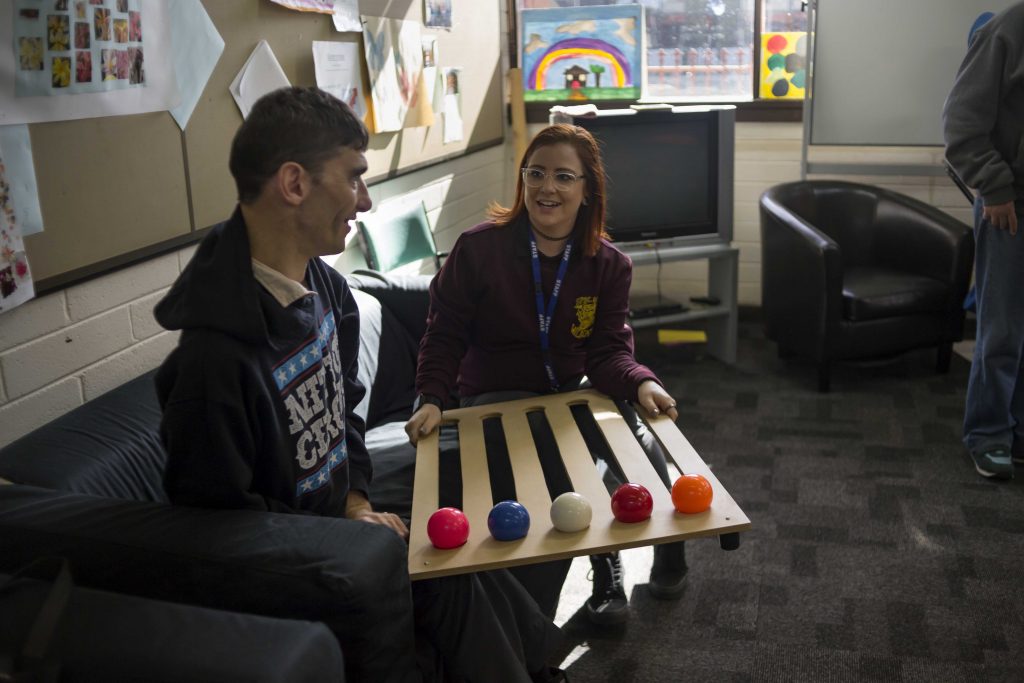The art of circus is being used to break down communication barriers for adults and children with intellectual disabilities.
Jamie Moore, an international social arts facilitator, teaches open classes for people with intellectual disabilities at Westside Circus and upstart joined in.
Jamie started the class by telling students to stick their tongues out and point in every direction while humming the Mission Impossible theme song.
The reactions were priceless.
Giggling, a student said, “But it isn’t nice to stick your tongue out!” Jamie laughed, explaining that this activity was an exception.
Jamie believes that circus is more than just parlour tricks. It is actually a serious developmental tool designed as good fun.
To warm up, each class begins with mindful breathing and meditation to initiate focus. Then Jamie goes through a series of speech exercises following up with juggling lessons, poi, or other fun games. He believes the program – combining circus skills with meditation and voice work – improves motor and sensory skills in children and adults with intellectual disabilities.
The program has recently been implemented at Mambourin Disability Services in Braybrook and service providers have reported significant changes in the students’ behaviour and the way they interact with each other.
Mambourin Disability Services has eight sites in the western suburbs, including a day centre offering a wide range of activities and program. Classes in woodwork, horticulture and gardening are just some of the tools used to enhance everyday life and experiences for people with disabilities.
Lavinia Tukuafu, Mambourin Disability Service’s manager, tells upstart that the ‘Circus for Communication’ class has tapped into something really special.
“Way too often facilitators fail at helping an intellectually disabled person because they try to bring participants into their world. We can try to teach them the way we communicate, but it doesn’t work in their world. We have to get into their world.”
Students tell upstart that circus is their favourite class because it’s a lot of fun and they find it relaxing.
Another student says “I love this. I can nap!”
Jamie’s response is always “I take that as a compliment if I can get you to relax that much!”
Before this class, the staff state how it was absolutely impossible to get all the students laying down for 30 to 40 minutes straight.
“They tap into this energy and it is incredible to see them stay still in silence. The first time I saw it, I was just like, what is going on? There seems to be a deeper understanding of, ‘Ok, this is what is what we are doing’ and allowing themselves to be there present and in the moment.” says Lavinia.
Lavinia tells upstart that for one service user, seven to eight incident reports were being completed per week before implementing this class, but there have only been five to six incident reports in the past seven weeks. “Incident reports can be anything from throwing things to hitting.”
Every day is different for Jamie Moore.
“The entire lesson plan could change in the blink of an eye because some days you have to follow their lead.
“In its rawest form, circus is really just about communication. People with intellectual disabilities struggle to communicate. Any way that I can help improve the communication between their mind and their body, or thoughts and actions, or even just communication between their [own] selves and other people, is hugely beneficial.”
One student who suffers from cerebral palsy only has the ability to move her eyes.
Jamie says, “Naturally, my instinct is to teach her juggling.”
He explains the idea of learning juggling conceptually. If someone is taught juggling, they learn when to throw a physical medium into a physical space. With conceptual juggling, Jamie works with another team member to help the student juggle through the means of someone else’s physical body. Each time the student makes eye contact with one person, an object is thrown to the person juggling.
Teaching conceptual juggling aids her understanding of timing, spatial shapes, and the concept of cause and effect.
“A physical reaction that I’m doing is causing a physical reaction in space; it’s a different type of experience that she doesn’t have because she has no control over her physical body. That extension of her abilities into a physical world is something really special for her…I can’t wait to see how it progresses.” says Jamie.
Jamie believes that a sense of achievement happens at every session.
“Amongst a plethora of other benefits that circus education provides, the one that has resonated with me the most is that any progress is impeccably clear, so a sense of achievement is taken from almost every activity.” Jamie tells upstart.
The progress of students at Mambourin Disability Services is celebrated by all in that community, and there will be many more fun times ahead.
For more information, contact Jamie at beaconcircus@gmail.com or Lavinia at lavinia.tukuafu@mambourin.org.

Bri is in her final year of completing a Bachelor of Science (Psychology) at La Trobe University as an exchange student from Louisiana State University. Follow her at @brithephotographer













